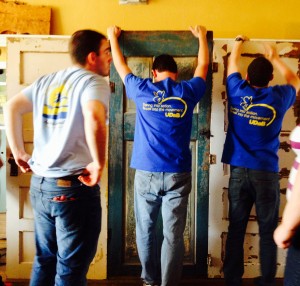Before you being reading this blog post, please take note of the following: I am a UDAB site leader. This organization means a great deal to me. So if you are sick of hearing about the productive/worldly/influential things that people did over break while you were at home watching Netflix or drinking in Florida, I get it. But you should also probably stop reading. Because this will make you vomit.
My freshman year of college, I randomly decided to apply for an alternative spring break trip. By complete chance, I was accepted to the program. The trip wasn’t perfect. We had to get up at 4:45 am and walk through campus with our snack-heavy duffels from Russell to Trabant. Our bus had a broken DVD player and axel, which busted somewhere in rural Virginia, leaving us stranded for four hours. I forgot a bandana and never had a hot shower. As a group we managed to obtain some very awkward tan lines.
It was without a doubt, the second best week of my life. I came back enlightened, inspired, and invigorated. In mid-May, I learned that I would be among the newest class of UDAB site leaders. I was ecstatic.
 As it turns out, planning an alternative spring break trip requires a great deal more work than participating in one does. My stress levels were almost entirely determined by what was happening with UDAB. If we had a SAS cupcake fundraiser approaching, I was happy. If we were sitting in Perkins for hours on end conducting interviews, I was drained. If I stopped for a single second to remember that I was leading a new trip to one of the most rural and impoverished areas in the country under the direction of lovable but less-than-organized hippies, I was panicked. Two days before the trip I found myself crying in a public bathroom and running on six hours of sleep in two days.
As it turns out, planning an alternative spring break trip requires a great deal more work than participating in one does. My stress levels were almost entirely determined by what was happening with UDAB. If we had a SAS cupcake fundraiser approaching, I was happy. If we were sitting in Perkins for hours on end conducting interviews, I was drained. If I stopped for a single second to remember that I was leading a new trip to one of the most rural and impoverished areas in the country under the direction of lovable but less-than-organized hippies, I was panicked. Two days before the trip I found myself crying in a public bathroom and running on six hours of sleep in two days.
Once again, my trip wasn’t perfect. We got somewhat lost in the back-roads of West Virginia. I unknowingly forced my participants to sleep in a frigid yurt (see Google for description) on the very first night. As it turns out, ticks are fairly common in heavily wooded areas and snow in late March is a possibility. My expectations were so far from reality, it was actually comical.
But it was, without a doubt, the best week of my life, for reasons that cannot be explained in simple words or iPhone photographs. I learned more from my fellow site leader, from my participants, and from our community partner in seven days than I learn over the course of an entire school year. For seven days, I lived life in the most beautiful way. For seven days, I was a part of something larger than myself.
UDAB is a lot of work. It’s a lot of higher-level thinking, advanced planning, organizational jargon, color-coded spreadsheets, and early-weekend-morning activities. Unlike so many things in life however, it’s worth every ounce of work exerted. I have zero regrets about the hours of sleep lost, the personal dishevelment obtained, the countless emails sent, or the quantity of tears shed. Because in the grand scheme of things, these negative aspects were minimal when compared to the reward. UDAB has brought me far more joy than sadness. It’s made my college experience. It’s shown me the best possible version of myself. It’s changed so many lives for the better, and I hope that this year’s participants had an equally incredible experience.
You can vomit now.












